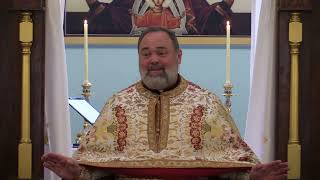 I confess I’m a bit of a rebel at heart. Maybe it’s my Southern American heritage, or maybe it goes further back in my lineage from my Welsh and Irish ancestry, but wherever it comes from, I tend to eventually have “complicated” relationships with authority. And what makes that more amazing is I started my adult work life as a police officer, one who “enforces” the law!
I confess I’m a bit of a rebel at heart. Maybe it’s my Southern American heritage, or maybe it goes further back in my lineage from my Welsh and Irish ancestry, but wherever it comes from, I tend to eventually have “complicated” relationships with authority. And what makes that more amazing is I started my adult work life as a police officer, one who “enforces” the law!
But maybe it isn’t so much of a contradiction. You see, I tend to view mere control extremely negatively, but I view anarchy and lawlessness in the same light. As my formation in the Orthodox Church continues I’m beginning to see why that is the case.
You see, Orthodoxy isn’t about rules, but it isn’t about anarchy either. No, the Timeless Faith continues the rhythm of God’s relationship with Man based on WISDOM. And wisdom comes from doing the hard work of being in relationship and seeing behind the “rules” to the wisdom preserved in these dictates for our salvation. The Rules aren’t there to “Force” me, but to “inform” “transform” and “reform” me based on the lived experiences of the People of God with the Holy Spirit. Don’t reinvent the wheel. You don’t have to learn the lessons already learned the hard way IF you have the courage and humility to embrace wisdom.
Look at our lesson today in Matthew 12:9-13:
At that time, Jesus entered the synagogue of the Jews. And behold, there was a man with a withered hand. And they asked him, “Is it lawful to heal on the sabbath?” so that they might accuse him. He said to them, “What man of you, if he has one sheep and it falls into a pit on the sabbath, will not lay hold of it and lift it out? Of how much more value is a man than a sheep! So it is lawful to do good on the sabbath.” Then he said to the man, “Stretch out your hand.” And the man stretched it out, and it was restored, whole like the other.
The scene is well known. Jesus made it a habit to go to synagogue every Saturday as was Jewish law, and He knew the ceremonial laws about rest the Jews had practiced for centuries. He also knew the hearts of the religious leaders and their attitudes that had developed about these religious rules. Something had to change because following the rules had become more important than loving God and loving your neighbor. The reason for the rules had been forgotten so the very act of keeping the rules had lost its intended purpose to show just how much we needed mercy, forgiveness, and God’s grace.
Jesus was a noted “rabbi” or “teacher, so He was used to being asked to speak at synagogue and here He is asked a question that would reveal WHY the rules were there in the first place. Jesus asks this crowd, and He asks us “Is it lawful to do good on the sabbath?” This was His response to their question “Is it lawful to heal on the Sabbath?” Of course, they only asked the question to trap Him. But the Lord turned the tables on them and revealed them to be the actual lawbreakers.
Jesus tied doing “good” on the sabbath to the value of the person who was suffering. And He revealed that these very same sanctimonious “rule-keepers” would justify “working” on the sabbath if one of their livestock fell in a pit. Jesus reveals these leaders’ true darkness in displaying for everyone to see that these men loved their livestock more than the poor man suffering with a withered hand. This blindspot in the hearts of these leaders uncovered the ugly truth that their “rule-keeping” was nothing more than an excuse to exercise “power” and “authority” over others, not to see the value in measured rest at least one day a week for a healthy body and soul. They had so abused the rules of the sabbath for their own sakes as to make the Lord’s compassionate actions that day “bad” instead of doing “good” on the Sabbath.
But that always happens when you try to reduce wisdom to rule-keeping. You dehumanize the wisdom of the Faith for your own pride so that you can be “technically” righteous without the hard stuff of loving your neighbor or your enemy. You cite all the “religious reasons” why “those people” are wrong or bad or “unacceptable” and then make a religious justification for acting in an unloving manner, even resorting to force to ensure “compliance” with the rules. And I have to ask, does that ever lead to deeper relationships? Does it ever really work to insure obedience in the long run. It usually doesn’t. In fact, the results of that too small a WHY for obedience usually create a backlash that has those who wouldn’t obey fighting to get power to exact revenge on those who had the power.
Think of the 12-year-old Christian boy, St. Hyacith, whom we remember today for his bravery and faithfulness. He was raised by a pious Christian family in Rome and at the tender age of 12, he was chosen to be an assistant to the chamberlain of the Roman Emperor Trajan at the beginning of the 2nd century AD. When the other household workers in the palace noticed Hyacinth was not participating in the idol offerings expected of Cesar’s household, he was confronted and bravely confessed he was a Christian. This precious and brave boy was then imprisoned in a room and only offered food that had been sacrificed to the pagan gods. This was forbidden by both Jewish and Christian wisdom so the young boy refused to eat what was offered. He died of starvation rather than deny the wisdom of the Faith. It has been said that, just before his death, one of his jailers saw the boy being comforted by an angel in his cell and the angel was placing a crown on his head. It would have been easy for St. Hyacinth to follow the rules of the Imperial household and live, but even at the age of 12, this young man understood that the lived wisdom of the Faith was deeper and better than merely “following the rules.” It cost him his earthly life, but it granted him a strong witness before the Awesome Judgement seat of Christ!
Today, are you willing to do the hard work of embracing wisdom or do you catch yourself cutting short this hard work in settling for some mere rule-keeping? The Faith invites us to a much more difficult but ultimately more healthy and mature path; the path of loving God so much and loving our neighbors so much that we joyously embrace the wisdom of rules for their sake. This is the true aim of living the Normal Orthodox life!
P.S. With rays of grace you do shine to the ends of the world, like a hyacinth in Christ’s Church, O blessed Hyacinth; for your confession of the Faith was radiant; and in your contest, you followed Christ the Word. You do forever illumine those who honor you.



